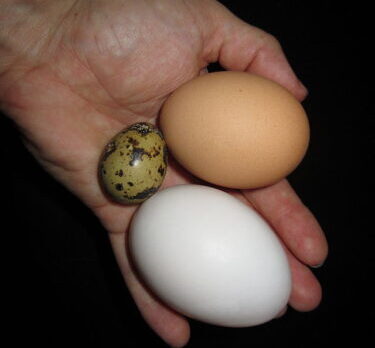Anyone who has kept ducks on their plot will sing the praises of the eggs. So how do they compare with chicken eggs?
Duck eggs are bigger than chicken eggs: they weigh 70-80 grams, as opposed to a jumbo chicken egg which should be more than 66 grams. Duck egg yolk is disproportionately larger in relation to the albumen.
The fat content is higher in a duck egg, but so is the level of cholesterol.
The duck egg has more Omega-3 fatty acids ~ 71.4 milligrams vs 37 milligrams, along with more protein.
Duck eggs are also higher in calories: 130 calories vs 71 calories.
Duck eggs help to build muscle and boost skin health. Because they are rich in magnesium, selenium and zinc, they support mental health. The vitamins a duck egg contains have numerous nutritional benefits.
The flavour is richer and creamier.
Duck eggs can be cooked in the same ways that chicken eggs are cooked: boiled, poached, fired, scrambled and turned into omelettes.
Baking with duck eggs might require some experimentation. You can work on the basis of two duck eggs to three chicken eggs, but because the proportions of the contents are different your cake might not turn out the way it usually does.
Duck egg shells come in a wide variety of colours, depending on the breed, including white, various shades of grey, light green, brown, speckled or pale blue. However, the colour does not affect the flavour or the contents in any way.
The duck shell is thicker than that of a chicken.
Eaten in moderation, duck eggs can form a part of a healthy diet.
To read more about poultry click here.
To subscribe to SA Smallholder click here.


What types of ducks can be purchased in S.A.and the sources?
Can ducks be kept with chickens in the same coop?
Do ducks need a trough or small pond?